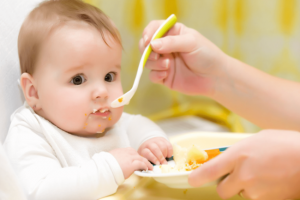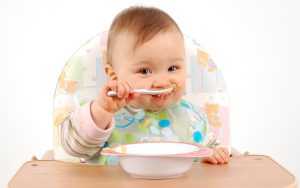How to reduce the risk of developing allergies in a baby in the first year of life

In the first hours, days, weeks of life, the intestinal microflora of the child is formed, and breastfeeding plays a significant role in this. Correct colonization of the baby’s intestines prevents the development of allergic reactions and food intolerances. What can a nursing mother do to prevent her baby from being bothered by allergic reactions? First of all, watch your diet. You should eat regularly, despite the lack of time and energy. It would be nice for the family to understand well that if where their support and help is needed, it is in feeding a nursing mother, since with milk she loses protein and other nutrients, and she needs high-calorie diet food.
Dietary restrictions apply to foods that can cause allergic reactions or digestive problems in a breastfed baby. The younger the baby, the greater the risk of this kind of problem, and the stricter the restrictions. If one or both parents suffer from allergic diseases, the risk of developing allergies in children, in this case, increases. In general terms, spicy, fatty foods with seasonings and spices are not recommended. Sausages, dumplings and sausage are unhelpful, however, as well as heavy food, such as: mushrooms, eggplant, canned food, beans, beans, liver. Any food after which the child has signs of dermatitis on the skin should be excluded. Avoid eating foods with a pungent smell, such as onions, garlic, as they can give milk an unpleasant taste and smell. In the first 4-5 months, it is better not to eat fried foods, foods with flavor enhancers, dyes, food should be simple, so to speak, peasant, with a minimum amount of chemical additives. These measures should be especially strictly adhered to in the first 6 months. The older the child becomes, the more mature the intestines become, and the less the risk of developing food intolerances, directly related to what the nursing mother eats.
What can you eat? Stews, beef, and turkey are preferred. For taste, it is useful to put dill in the cooking process. You can boiled potatoes and in the form of mashed potatoes, cauliflower and zucchini, but white cabbage can cause bloating in the crumbs. Rice, noodles, spaghetti, suitable for garnish. Fresh, low-fat dairy products are good, especially yoghurts (no additives). Undoubtedly, cottage cheese is useful, as well as everything that can be prepared from it, primarily cheese cakes, casseroles, but the amount of products containing casein (cow’s milk protein) should be limited, as it often causes allergic manifestations. Compotes, jelly, baked fruits will not harm (I recommend not only apples, but also pears, peaches, as it is also very tasty).
There are also a number of foods that should be limited: these are raw fruits, which are best not to eat in the first 2-3 weeks, and then eat no more than one raw apple a day. It is best to be careful with fish, as it is an obligate allergen and can cause dermatitis in a child. Chocolate, exotic fruits, bananas are also not desirable. Limit whole milk and eggs too. It is especially necessary to strictly adhere to these rules for those women who themselves suffer from manifestations of food allergies. All other nursing mothers will appreciate the gradual weakening of the diet after the baby is 6 months old.
The above recommendations will help you avoid unnecessary problems and raise your children healthier.
In order to improve lactation, herbal teas with fennel, lemon balm, galega are recommended. In general, you should drink more liquid, this does not apply only to the second or third days after childbirth, since too much milk inflow can lead to lactostasis. The advice to eat more walnuts to maintain lactation should be considered controversial, since nuts are a very strong allergen. Milk tea should also be limited at first.
Unpleasant moments often accompany the intake of multivitamins, since it contains vitamin C. And although the instructions for use contain permission for the use of these vitamins by nursing mothers, they often provoke the development of dermatitis in babies. The best solution is to take one type of calcium, which helps to effectively replenish calcium stores and avoid thinning and damage of tooth enamel.
If a woman suffers from allergic rhinitis caused by tree pollen, then stone fruits, such as apples, cherries, cherries, pears, peaches, olives, and various types of nuts, should be excluded from the diet. If you are allergic to pollen of cereals and meadow grasses, you should not eat honey, herbal teas, as well as kvass, corn, peanuts, sorrel. If the symptoms of hay fever are caused by the pollen of wormwood and ragweed (they usually bloom at the end of summer), then it is better to abandon sunflower oil, halva, melons (melons and watermelons). Treatment of nursing mothers who have allergies is not an easy task, since most drugs, even some nasal drops, require temporary cessation of breastfeeding. Because of this, preference should be given to local remedies, before taking which you need to consult a doctor.
It also often happens that the mother has allergic rhinitis https://en.wikipedia.org/wiki/Allergic_rhinitis associated with house dust or six pets. In these situations, close attention should be paid to hypoallergenic life, daily wet cleaning, it is necessary to wash pillows and blankets more often at a temperature of 60 degrees, as this is a good way to combat dust mites, which often provoke allergic rhinitis, as well as asthma. In addition, a good measure is to clean the air from dust, fungal spores, animal hair. For this, special air purifiers are used, on the filters of which various types of allergens are deposited.